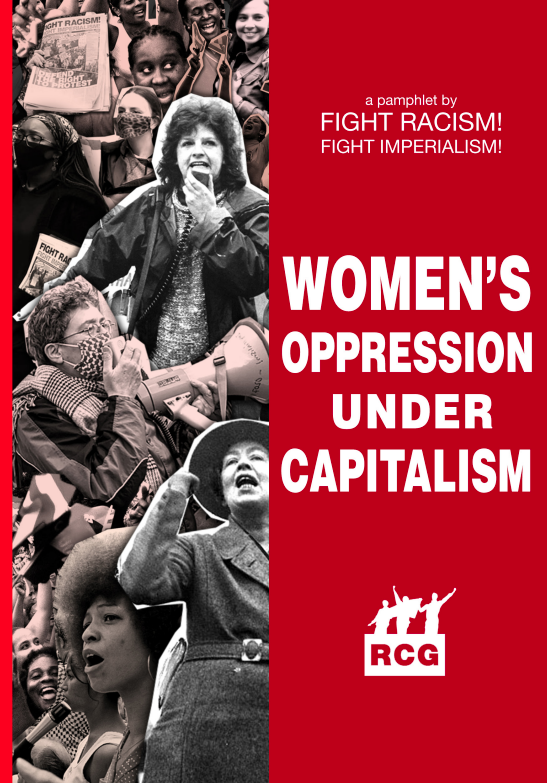
Women’s oppression under capitalism, edited by Susan Davidson, Larkin Publications, 76pp, £2.95 from FRFI.
Fight Racism! Fight Imperialism!’s Women’s oppression under capitalism pamphlet comes at a critical time. In March Sarah Everard’s murder at the hands of a British police officer ignited street protests around the country opposing violence against women while in the same month Turkey pulled out of the Istanbul Convention introduced in 2011 to combat gender-based violence. In May a UN envoy warned of a global pandemic against women and in August the US Supreme Court escalated the roll back on women’s reproductive rights by refusing to block the Texas abortion ban.
These events are part of a renewed attack on women across the world. Commentators usually divorce them from a class basis and consider them a question of culture and identity. Women’s oppression under capitalism pushes past these limitations to place the fight against women’s oppression in all of its forms within the global context of decaying monopoly capitalism, or imperialism. At the pamphlet’s centre is the understanding that the fight for socialism is necessary to achieve women’s liberation.
This significant work builds on an article of the same name produced in the theoretical journal Revolutionary Communist 5 in 1976. Both works explain Marx’s understanding of the material basis of women’s oppression as being located in the capitalist mode of production. It is women’s dual role in capitalist society as ‘[bearing] the main burden of private, unwaged domestic labour within the home while at the same time occupying an inferior position in social, waged labour’ [chapter two, ‘the political economy of women under capitalism’, p22] that underpins the specific oppression of women under capitalism.
Capitalism and imperialism
Chapter one, ‘The pandemic in Britain’, explains how the capitalist system is reliant on ‘the family’, and therefore on women to perform privatised, unpaid work within the home. ‘The basic conditions for women’s true social equality, such as free and accessible childcare facilities, have not been won under the capitalist system’ [p73] because capitalism expects women to perform this labour – taking care of elderly relatives, replenishing families and raising the next generation of workers – for free.
This is strengthened in times of economic crisis when state expenditure is cut. Since the outbreak of the coronavirus pandemic in early 2020, the British government has supported the private sector at the expense of the public sector every step of the way, building on decades of cuts to publicly funded healthcare, childcare and education. Childcare costs for working parents have increased by 52% over the last 10 years, compared with an average wage increase of 17%. 84% of care home beds are owned by private corporations.
The capitalist crisis of accumulation, intensified by the coronavirus pandemic, has pushed women further back into the domestic sphere: mothers in Britain are twice as likely as fathers to have taken time off work without pay during the pandemic lockdowns [p13] due to their domestic responsibilities and requests for furlough being refused.
For the 85% of migrant women in Britain who are employed in low-paid domestic and caring sectors, often in precarious work conditions without contracts, sick or holiday pay [p32], taking unpaid leave has not been an option. A large proportion of ‘frontline workers’ in private and public health and social care sectors are poached from oppressed and underdeveloped countries, as is explained in chapter three ‘Women and Imperialism.’
Imperialism has spread capitalist relations of production to the entire world, resulting in a division of labour between nations. Underdeveloped countries like the Philippines operate schools specifically to produce nurses for export to meet demand from the imperialist countries, meaning ‘families split apart, migrant workers subject to intensive exploitation, and the chronic understaffing of the country’s own health system’ [p38]. 60% of migrants leaving the Philippines are women.
Socialism
Economic crises result in a shrinking of state expenditure on welfare, but also an ideological reassertion of traditional ‘family values’ that define women as breeders. Chapter four, ‘Global reaction against women and “others”’, explores the ‘“divide and rule” policies [that] are appropriated by populist governments to undermine class consciousness and solidarity’ [p43] when standards of living for the working and middle classes are eroded. Reproductive rights are rationed, domestic violence increases, discrimination and prejudice against ethnic and national minorities, people with disabilities and with diverse sexual orientations are strengthened.
The aggressive policies against women and ‘others’ must be recognised as attacks on the working class as a whole. The pamphlet argues that it is only the principles of solidarity and unity that can combat this ruling class division, not the personalised identity politics that has tended to fragment resistance [p42]. Chapters five, ‘Women and socialism’, and six, ‘Women in the struggle’, demonstrate the history of these principles in action.
From the Russian Revolution ‘[inspiring] generations of women to work for a future society liberated away from the traditional barriers of gender, class and race’ [p66] to socialist Cuba existing as an example ‘of what is possible to achieve for women’s liberation and for the working class’ [p59], socialist organisation of society stands as the only way to overcome the inferior position that women occupy in capitalist social production and ensure that women can take full part in public life. A planned economy and the socialisation of domestic work and childcare are fundamental steps to removing the material basis for women’s oppression. The struggle for women’s liberation therefore necessarily involves a struggle for socialism.
Women’s oppression under capitalism is an essential read. The reader gains a framework to explore the coronavirus pandemic, environmental destruction, inter-imperialist rivalries, migration, reproductive rights and benefit cuts as part of the study of women’s oppression. The many examples of women-led resistance in Britain and around the world will inspire you to play an active role in the fight for socialism and the conditions for the emancipation of women.
Ria Aibhilin
Fight Racism! Fight Imperialism! No 284, October/November 2021




